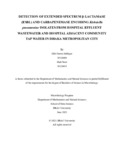Detection Extended Spectrum β-Lactamase (ESBL) and Carbapenemase encoding Klebsiella pneumoniae isolates from hospital effluent wastewater and hospital adjacent community tap water in Dhaka metropolitan city
Abstract
Klebsiella pneumoniae is one of the most occurring opportunistic microbial species responsible for pneumonia infections as well as nosocomial infections (Cordova-Espinoza et al., 2023). This species of bacteria is mostly found in the environment including soil, surface water, and medical devices (Valenzuela-Valderrama et al., 2019). Among Klebsiella pneumoniae, those strains that produce extended-spectrum beta-lactamases are important pathogens responsible for nosocomial infections which can extend to serious bacteremia and pneumonia (Filis et al., 2021). A global study has shown that around 20% to 80% of Klebsiella pneumoniae were resistant to first-line antibiotics like cephalosporins, fluoroquinolones, and aminoglycosides back in the 2000s (Pitout et al., 2015). The multi-drug resistance state of K. pneumoniae has led to the emergence of incurable diseases. In our study, we aimed to find ESBL encoding and Carbapenem-resistant Klebsiella pneumoniae isolates from the Hospital wastewater and their adjacent community tap water of Dhaka Metropolitan City. From our study of 82 confirmed K. pneumoniae isolates, 24 isolates were selected based on the phenotypic characteristics of the Antimicrobial Susceptibility Test (AST). Among these 24 isolates, 23.3% were positive for blaCTX-M and 6.7% were positive for blaTEM, blaKPC, and blaNDM-1 genes respectively. Moreover, for the SHV gene, 56.7% of isolates were positive. This ratio indicates that the bacteria K. pneumoniae acquired from both the hospital effluent and community tap water retains the ability to resist multiple classes of antibiotics.

